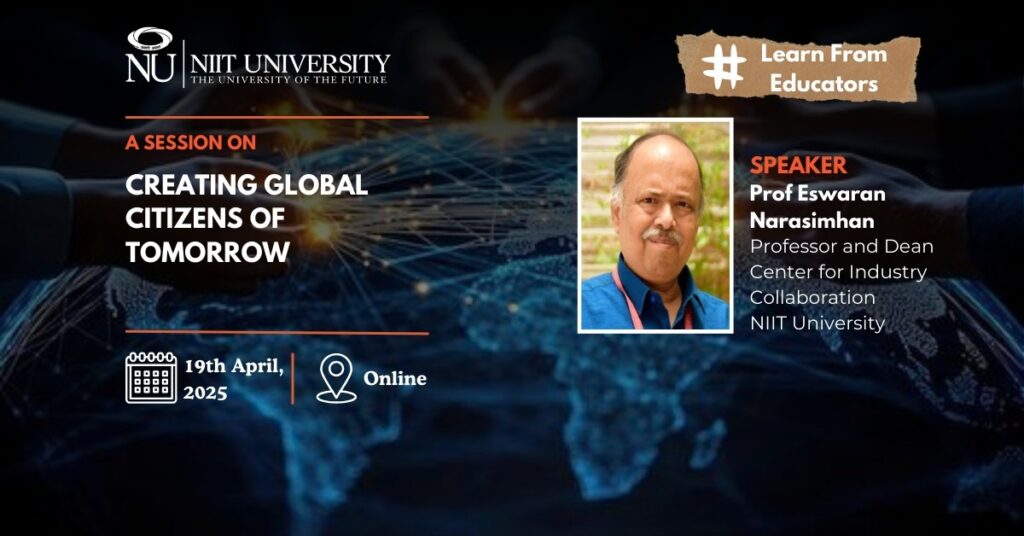Watch us in portrait mode to discover what makes us different.

In a motivational session, NIIT University had the honour to welcome Professor Eswaran, a veteran professor in the department of Computer Science and Engineering. With over 35 years of teaching and consulting experience, Professor Eswaran painted a thought-provoking anecdote that adeptly spanned the past and the present and enabled students to realize their position in a vastly interconnected digital age.
Professor Eswaran started with an unbelievably personal description of a solo trip by train from Mumbai to Howrah in 1975 when he was 16 years old. Two nights altogether—no mobile phones, no instant messaging—just determination and hope.
It took nearly 10 days for his parents to receive a postcard that he had arrived safely. This set the stage for a contrast with today’s reality in which GPS sharing of locations, video calls, and texting have eliminated suspense and anxiety about travel in the past. “From postal delays to real-time location sharing, the world has changed — and so have we.”— Professor Eswaran
Professor Eswaran acknowledged that it was our generation that had built the virtual world and enabled unprecedented availability, convenience, and connectivity. But he warned that today’s students — digital natives — are building a reoriented mindset fueled by instant gratification, information nuggets, and algorithmic personalization.
He demonstrated how Google and social media confine people in “filter bubbles” — a term brought into style by Eli Pariser in 2010 — where people are shown information based on previous actions, more and more excluding other viewpoints.
“You feel like you’re being schooled but you’re being fed a lot of what some algorithm thinks you’d like to be fed.”
This advancement, to be as worthwhile, also incorporated indirect but pronounced losses.
Arguments used to be intellectual conversations — measurable, thought out, and sophisticated. Since facts can so easily be googled now, and in a half second to boot, arguments are being replaced by ideological yelling or, worse yet, silence. A culture of debate and dissent, necessary if one wishes to learn, is being forfeited.
The experience of growing up in a hyper-connected yet increasingly isolated society. The simulated “likes” are replacing meaningful emotional experiences offline. The students have vast numbers of off-line friends but few off-line relationships and therefore find themselves lonely in a group.
From the outcomes of cricket matches to food being readily available, we have grown up with everything readily available now. With all this instantaneity, our patience level has come down, and our tendencies for bearing have also come down because bearing is an Indigenous psychological faculty when it comes to endurance and long-term achievement.
Despite all these challenges, Professor Eswaran stressed that today’s students have phenomenal potential. Their minds are more flexible, more eclectic, and more receptive to innovation. But with the potential comes responsibility.
“We made the tools, but you must learn to use them — not as consumers, but as global citizens.”
He challenged students to be more aware of their online footprint, engage in some good old-fashioned talk, and create a world perspective—a world perspective that is willing to listen to people out, educated, and compassionate.
The lesson was also a whispered suggestion, a reminder that might pass by unheeded, to parents and teachers: the technology we pass on to our children is potent. But if we’re not showing them how it is used, too, we might bring up a generation that’s skilled in none of curiosity, community, or compassion.
“Your kids can use every app — but are they even listening, thinking, or arguing?”
NIIT University’s “Learn from Educators” series continues to take us to meet with such uplifting voices as Professor Eswaran — voices that disturb, inspire, and compel learners to match the changing world.
In his candid yet vivacious address, Professor Eswaran left everyone in the auditorium with a single message: Take time to connect, ponder, and learn in the era of everything in an instant.